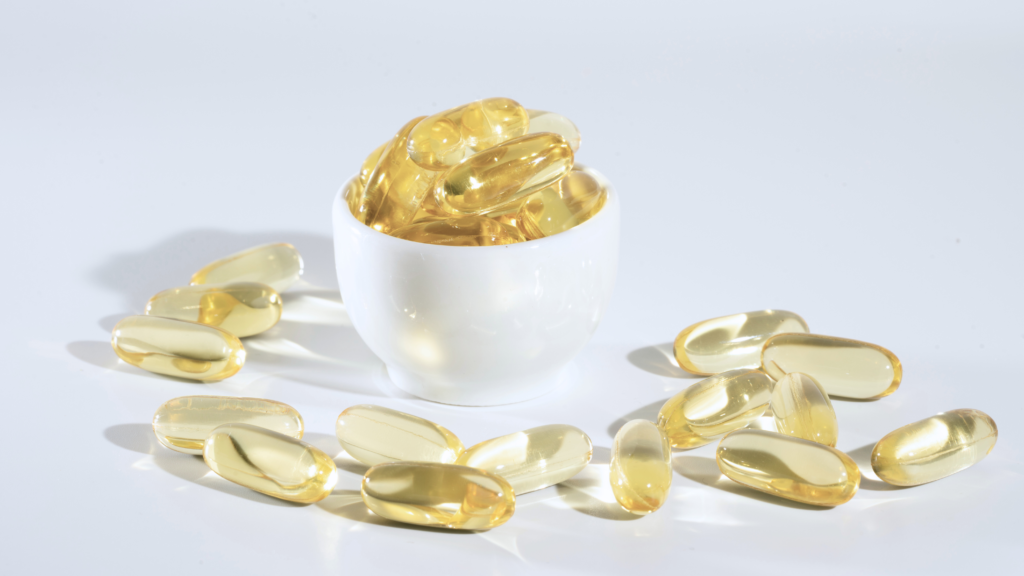Elevate Your Energy Levels with B Vitamins: Tapping into the Energy Amplifiers

In today’s fast-paced world, maintaining optimal energy levels isn’t just a luxury—it’s a necessity for staying on top of your game. Amidst the myriad of strategies to combat fatigue, there’s one powerhouse solution often overlooked: the energizing prowess of B vitamins. These tiny nutrients wield immense power in our body’s energy production, and in this article, we’ll delve into how they can supercharge your vitality. B Vitamins: The Dynamo of Energy Picture B vitamins as the dynamic team working behind the scenes to transform the food you eat into the fuel your body craves. These water-soluble wonders are the unsung heroes of metabolism, ensuring that carbohydrates, proteins, and fats are efficiently converted into energy. Turbocharged Energy Production Among the B vitamin lineup—think B1 (thiamine), B2 (riboflavin), B3 (niacin), B5 (pantothenic acid), B6 (pyridoxine), and B12 (cobalamin)—each member plays a pivotal role in the creation of adenosine triphosphate (ATP), the cellular currency of energy. By fine-tuning metabolic pathways, B vitamins streamline ATP synthesis, resulting in a noticeable uptick in energy levels and endurance. Optimized Nutrient Absorption Some B vitamins, like B12 and B9 (folate), go beyond merely boosting energy production. They act as facilitators, ensuring that other essential nutrients are absorbed and utilized effectively. For instance, B12 teams up with iron, a key player in oxygen transport and energy generation. By optimizing nutrient absorption, B vitamins guarantee that your cells receive the fuel they need to thrive. Sharper Brainpower A sharp mind is indispensable for navigating life’s challenges with finesse. B vitamins, especially B6, B9, and B12, are staunch supporters of brain health. They aid in the synthesis of neurotransmitters—think serotonin, dopamine, and norepinephrine—that govern mood, motivation, and mental clarity. By fostering neurotransmitter production, B vitamins promote heightened alertness, laser-sharp focus, and overall cognitive prowess. Stress Resilience and Mood Boost In a world filled with stressors, maintaining equilibrium is key to preserving your energy reserves. B vitamins, notably B5 and B6, step in as stress-busting allies by regulating the synthesis of cortisol, the body’s primary stress hormone. By bolstering the adrenal glands and fostering a balanced stress response, B vitamins help stave off fatigue, uplift mood, and fortify your resilience against life’s curveballs. Heart Health and Oxygenation Efficient energy levels hinge on optimal oxygen delivery throughout your body. B vitamins like B6, B9, and B12 contribute to the production of red blood cells and hemoglobin, the molecule responsible for ferrying oxygen. By nurturing cardiovascular health and ensuring adequate oxygenation, B vitamins lay the groundwork for sustained energy production and vitality. Revving Up Mitochondrial Function Meet your body’s energy powerhouses: the mitochondria. B vitamins such as B2, B3, and B5 are instrumental in bolstering mitochondrial function, particularly in the electron transport chain where ATP is generated. By fine-tuning mitochondrial efficiency, B vitamins rev up energy production and combat fatigue at its source. When it comes to elevating your energy levels and banishing fatigue, harnessing the potency of B vitamins could be the game-changer you’ve been seeking. These essential nutrients serve as catalysts in the intricate web of energy production pathways, supporting metabolism, nutrient absorption, and overall vitality. Whether you opt for B vitamin-rich foods like whole grains, legumes, leafy greens, and lean meats or explore supplementation under the guidance of a healthcare professional, tapping into the energy-boosting potential of B vitamins is an essential step toward a vibrant life filled with vitality and sustained energy. Book a discovery call to begin your journey towards a more vital and healthier you.
More Protein, Fewer Fractures?

Animal protein sources
Supplements for Natural Mood Support

While the world often seems enamored by quick pharmaceutical fixes, natural approaches to improving mood aren’t given their rightful due. Instead of relying solely on prescriptions to manage mood-related issues, incorporating healthier lifestyle choices and targeted nutritional supplements can have profound benefits. It may even provide the mood support you’ve been seeking all along. Understanding the Power of Natural Supplements The natural world has a bounty to offer when it comes to promoting overall well-being and mental health. Nutritional supplementation is a potent ally in supporting mood regulation. From providing vital nutrients that support optimal brain function to boosting neurotransmitter synthesis, the role of nutrition and supplements in mood stabilization is indispensable. Key Supplements for Mood Support St. John’s Wort: Known widely as a mood-enhancing herb, St. John’s Wort can be a powerful aid for emotional well-being. However, this comes with caution as it can interact with certain medications. Always consult your healthcare provider before usage. Tryptophan or 5-HTP: These natural substances can boost the production of serotonin, a neurotransmitter with a significant role in mood regulation. Remember to consult with a healthcare professional before incorporating these supplements into your routine. B vitamins: Integral to neurotransmitter production and energy metabolism, B vitamins can support brain health and uplift mood. Look for high-quality B Complex or multivitamins for overall well-being. Omega-3 fatty acids: Serving as the building block of brain cells, Omega-3 fatty acids support adequate brain function and promote healthy inflammatory pathways, leading to an improved mood. The key to enhancing our moods may lie in understanding the relationship between nutrition, supplements, and mental health. Embracing a holistic approach incorporating good nutritional choices, regular exercise, essential supplementation, and professional health advice can help elevate mood and optimize mental health. Remember that your journey to mood support is personal; what works for one may not work for all. Book a discovery call to begin your journey towards a more vital and healthier you.
5 Habits to Avoid for Better Sleep

From maintaining high energy levels to promoting mental clarity, the importance of quality sleep cannot be overstated. Sleep is the backbone of our overall well-being and is crucial for weight management. However, many unknowingly indulge in certain habits that sabotage our good night’s sleep. Do you do any of these 5 things that could be secretly ruining your sleep? Alcohol While alcohol may initially seem like a sleep aid, it ends up disrupting the natural sleep cycle. Alcohol’s calming effects on the nervous system gradually wear off as the night proceeds, often causing disruptions in your slumber. To improve sleep quality, it is essential to limit your alcohol consumption, particularly close to bedtime. Sugar The rollercoaster of blood sugar fluctuations caused by consuming sweets and refined carbohydrates can significantly disrupt sleep. Instead of sweets, opt for nighttime snack options that are friendlier to your sleep, such as nuts, berries, and whole grains. Late-day Caffeine It takes a significant amount of time for caffeine to metabolize in our body. Consuming caffeine late in the day can interfere with falling asleep due to its stimulatory effect. To enhance your sleep, consider reducing your caffeine intake in the afternoon and evening. Lack of Movement and Exercise Physical activity is key in regulating hormones, maintaining a healthy internal clock, and promoting quality sleep. Even light movement, like a short walk or gentle yoga, can have beneficial impacts. Incorporate movement and exercise into your daily routine for better sleep. Nighttime Screens The blue light emitted by electronic devices such as smartphones and laptops can suppress the production of melatonin—a hormone that regulates sleep. To improve your sleep, consider using blue light filters on your devices or, better still, implementing a technology-free bedtime routine. Sleep is more than just a restorative function; it’s a cornerstone for optimal health. Book a discovery call to begin your journey towards a more vital and healthier you.
Power of Chamomile Tea

Do racing thoughts keep you up at night, making a good night’s sleep an elusive dream? If so, you’re not alone. Sleep can be elusive for many, often due to an overactive mind and persistent worries. This post is crafted precisely for those seeking tranquility in the depths of the night. Our minds respond to both physical and mental inputs, making bedtime rituals a crucial tool in the quest for quality sleep. Among various options, chamomile tea stands out as a gentle yet potent ally. Chamomile’s Calming Influence: This delicate herb, a staple in herbal traditions, carries a legacy of calming the nervous system and promoting relaxation. Transitioning to Calm: Savoring a cup of chamomile tea marks an intentional transition to a state of tranquility. This act sends a gentle but powerful message to the brain that it’s time to unwind and prepare for restful slumber. In the realm of natural remedies for peaceful sleep, chamomile has held a significant place for centuries. Its soothing properties offer a simple yet effective way to wind down and prepare the mind and body for a restorative night’s sleep. So, what do you think? Are you willing to give chamomile tea a try? Book a discovery call to begin your journey towards a more vital and healthier you.
How Does Omega-6 Affect Your Metabolic Health?

Is your metabolism losing its youthful vigor? Are you noticing a gradual weight gain or a decline in your energy levels? If you answered ‘yes’ to any of these questions, then today’s blog post is tailor-made for you. The Twin Culprits of Aging Metabolism Before delving into the latest evidence-based research, it’s crucial to understand the two pivotal factors that drive an aging metabolism: • Insulin Resistance • Chronic Inflammation In the case of insulin resistance, the body’s cells lose their ability to effectively respond to insulin, which plays a vital role in balancing blood sugar. Meanwhile, Chronic Inflammation can be a pervasive issue that contributes to a range of health concerns, from heart issues and stroke to diabetes and cancer. And the good news? There are plenty of methods to reverse these detrimental effects. The Omega Factor: New Study Insights A systematic review and meta-analysis recently discovered a direct correlation between the blood levels of omega-6 and omega-3 fatty acids and vital metabolic markers in middle-aged adults: Surprisingly, elevated levels of omega-6 fatty acids were linked to adverse metabolic indicators such as higher insulin resistance, chronic inflammation, and poor cholesterol profiles. This type of fat, mainly found in refined vegetable oils and processed foods, can be a root cause of disease. On the flip side, increased levels of omega-3 fatty acids showed a correlation with healthier metabolic markers. This essential fatty acid, prevalent in sources like nuts, seeds, and seafood, is known to reduce the risk of heart disease. Food Choices: Your Path to Better Health Elevating your health is as simple as making the right food choices: ✖️ Main food sources of omega-6 fats: Refined oils and processed foods ✔️ Main food sources of omega-3 fats: Nuts, seeds, and seafood Navigating the complexities of essential fatty acids like linoleic acid and gamma-linolenic acid doesn’t have to be daunting. As a functional medicine nurse practitioner, I guide my clients through the world of holistic health, helping them find foods, recipes, and targeted supplements that fit their lifestyle and support their overall health and vitality. Book a discovery call with me today to embark on your journey toward a more vital and healthier you.
Lavender Essential Oil for Restful Sleep

Are you struggling to get a peaceful night’s sleep? You’re not alone. Lavender essential oil is one such remedy that has shown promising results in improving sleep. We all want a rejuvenating sleep that prepares us for the challenges of the next day, and while there are countless products that promise better sleep, it’s always a joy to discover natural solutions with science to back them up. Recent research indicates that lavender essential oil might just be the sleep aid you’ve been looking for. One study even found that college students who wore a chest patch infused with this essential oil not only slept better but also woke up feeling incredibly refreshed. How’s that for waking up on the right side of the bed? Wondering how to harness the power of lavender for a restful sleep? Here are some easy ways: • Dab a small amount on your wrists & temples to relax your mind.• For deep slumber, apply some on the soles of your feet before hitting the sack.• Enhance the ambiance of your bedroom by using it in an aromatherapy diffuser.• For a luxurious bedtime routine, add a few drops to your warm bath. Want to learn more natural tips and tricks for better health and wellness? Book a discovery call with me today and embark on a journey to a more vital, healthier you.
Optimizing Physical Health for Better Sleep

Are you tired of hearing about the importance of sleep for your overall health? It’s true that a good night’s rest is vital, but have you ever considered that your daytime activities and habits play a crucial role in ensuring you get the quality sleep you need? Here’s how you can optimize your physical health to enjoy better sleep. Set Your Internal Clock: Wake Up Consistently One of the key factors in regulating your sleep is maintaining a consistent wake-up time. Your body has its internal clock, known as the circadian rhythm, which influences when you feel awake and when you feel sleepy. By waking up at the same time every day, you help your body synchronize with this natural rhythm. This consistency helps regulate hormone production, making it easier to fall asleep and wake up refreshed. Embrace the Sun: Boost Vitamin D and Sleep Regulation Sunlight exposure isn’t just for a healthy tan. It’s also crucial for your sleep quality. Sunlight helps your body produce vitamin D, a nutrient known to play a significant role in regulating sleep. Exposure to natural light during the day helps reinforce your circadian rhythm and promotes better sleep at night. So, make it a habit to spend some time outdoors and soak up the sun. Move for Better Sleep Quality Regular physical activity isn’t just beneficial for your body’s fitness; it also contributes to better sleep quality. Engaging in regular exercise helps reduce stress, anxiety, and depression, all of which can disrupt sleep patterns. Just be mindful of the timing; avoid strenuous exercise close to bedtime, as it can have the opposite effect and make falling asleep more challenging. Stay Hydrated: Regulate Core Body Temperature Dehydration can lead to discomfort and affect your sleep quality. Proper hydration helps regulate your core body temperature, which is essential for falling and staying asleep. However, try to limit your fluid intake in the hours leading up to bedtime to minimize nighttime awakenings for trips to the bathroom. Eat for Blood Sugar Balance Your diet plays a significant role in how well you sleep. Blood sugar levels that are too high or too low can disrupt your sleep patterns. To maintain balanced blood sugar levels, focus on a diet rich in whole foods, fiber, and healthy fats. Avoid large, heavy meals close to bedtime, and steer clear of excessive caffeine and sugary snacks in the evening. In conclusion, achieving restful nights is not just about what you do before bedtime; it’s about how you treat your body throughout the day. By following these tips to support your physical health, you can optimize your chances of enjoying better sleep. Remember, your sleep quality is a reflection of your overall well-being. Ready to take the next step towards better sleep and overall well-being? Book a discovery call with me today to explore how we can help you achieve your health goals. Sweet dreams and better days ahead!
Supplements for an IBS

One of the most common recommendations for people dealing with gas, bloating, or other irritable bowel issues is to follow a low-FODMAP diet. I agree that dietary changes are powerful for gut health! While we work on sorting out food triggers and dietary changes, we can also support the gut with supplements. None of this should be taken as medical advice, and it’s always best to work with a healthcare professional. These are simply some of the supplements I’ve seen to be most helpful for gut healing. Peppermint Oil Enteric-coated peppermint is one of the most researched supplements for irritable bowel. It contains essential oils that ease muscular spasms and intestinal pain. Iberogast Iberogast is a combination of 9 herbs to support gut health. It was originally popular in Europe but is now available worldwide. Digestive Enzymes Digestive enzymes can be supplemented to help process difficult-to-digest foods and reduce gas and bloating. Probiotics Probiotics are complicated. They can aggravate digestive issues if there is underlying SIBO, and different strains have different effects. Lactobacillus and Bifidobacterium may offer some benefits. Psyllium Fiber Psyllium is a source of soluble fiber that might benefit irritable bowel issues (be forewarned that some fibers can make issues worse!). Psyllium is recommended by the Canadian Association of Gastroenterology. Everyone is different! Just because these supplements worked for somebody else doesn’t guarantee they’ll work for you. We like to test for underlying causes and create a customized plan for each person. Want to work together? Learn about becoming a patient by clicking through our website.
Tips for Mindful Eating

Question for you. What were you doing the last time you ate (or is it right now)? Most people I know eat while driving, watching a show, scrolling through social media, or working at their desks. I want to shake things up here and suggest something radical. What about doing nothing other than EATING while you eat? It’s called mindful eating, and it might help with everything from overeating to indigestion to just everyday stress Here are a few more tips for mindful eating: Don’t skip meals If you sit down to eat feeling absolutely starving, it’s going to be hard to appreciate your food and eat slowly. Bring all your senses Take in everything about your meal—how it looks, smells, tastes, and feels in your mouth. Take small bites Eat slowly and allow yourself time to fully taste the food in your mouth. Appreciate your food Recognize that your food is nourishing you and be grateful for that. Mindfulness is all about holding your awareness at the moment. Are you ready to set down that phone and give mindful eating a try?



